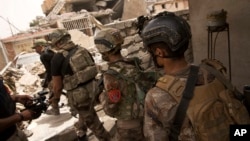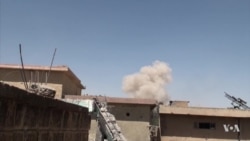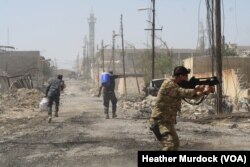Islamic State fighters defended their remaining stronghold in the Old City of Mosul, moving stealthily along narrow back alleys and slipping from house to house through holes in walls as U.S.-backed Iraqi forces slowly advanced.
The intensity of fighting was lower than on Sunday, when Iraqi forces announced the start of the assault on the Old City, a Reuters visuals team reported from near the front lines.
The historic district, and a tiny area to its north, are the only parts of the city still under the militants' control. Mosul used to be the Iraqi capital of the group, also known as ISIS.
"This is the final chapter" of the offensive to take Mosul, said Lieutenant General Abdul Ghani al-Assadi, senior commander in Mosul of Counter Terrorism Service.
The militants are moving house to house through holes knocked through inner walls, to avoid air surveillance, said Major-General Sami al-Arithi of the Counter Terrorism Service, the elite units spearheading the fighting north of the Old City.
“Now the fighting is going on from house to house inside narrow alleys and this is not an easy task,” he told state TV.
The Iraqi army estimates the number of Islamic State fighters at no more than 300, down from nearly 6,000 in the city when the battle of Mosul started on October 17.
More than 100,000 civilians are trapped in the densely-populated maze of narrow alleyways making up the Old City, with little food, water or medical treatment.
"An estimated 50,000 children are in grave danger as the fighting in Mosul enters what is likely to be its deadliest phase yet," Save the Children said Sunday night in a statement.
‘Caliphate’ nears end
A U.S.-led international coalition is providing air and ground support to the campaign.
The fall of Mosul would, in effect, mark the end of the Iraqi half of the "caliphate" that Islamic State leader Abu Bakr al-Baghdadi declared in a speech from a mosque in the Old City three years ago and which once covered swathes of Iraq and Syria.
The Iraqi government initially hoped to take Mosul by the end of 2016, but the campaign took longer as militants reinforced positions in civilian areas to fight back.
Islamic State is using suicide car and motorbike bombs, booby traps and sniper and mortar fire against the troops.
Hundreds of civilians fleeing the Old City have been killed in the past three weeks, as Iraqi forces could not fully secure exit corridors.
Islamic State snipers are shooting at families trying to flee on foot or by boat across the Tigris River, as part of a tactic to keep civilians as human shields, according to the United Nations.
The militants are also retreating in Syria, mainly in the face of a U.S.-backed Kurdish-led coalition. Its capital there, Raqqa, is under siege.
Baghdadi has left the fighting in Mosul and Raqqa to field commanders, becoming effectively a fugitive in the border area between Iraq and Syria.
About 850,000 people, more than a third of the pre-war population of the northern Iraqi city, have fled, seeking refuge with friends and relatives or in camps, according to aid groups.









